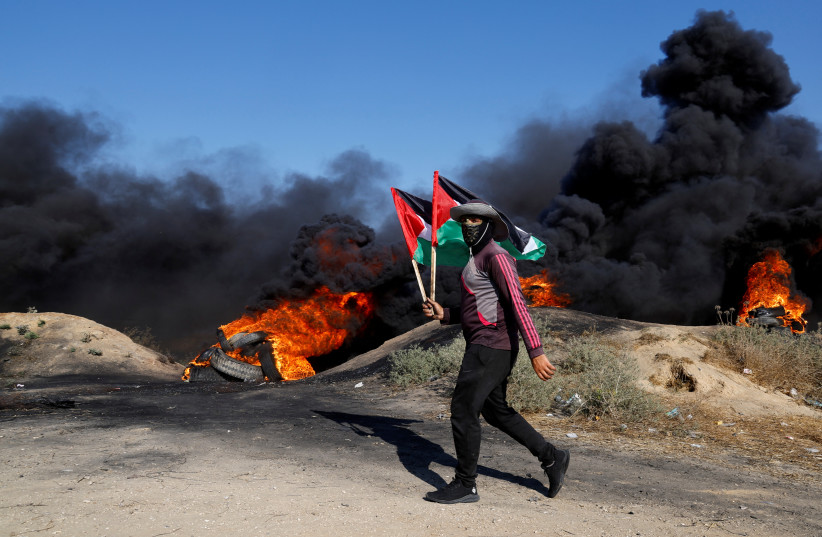Will IDF’s war on Jenin stop wave of terror against Israelis? – analysis
No one, including the IDF, knows yet what will come from the new large operation (yes, it is an operation despite being downplayed by the IDF) in Jenin.
Part of that is because no one really knows how far the IDF is going to go, how the West Bank Palestinians will respond (they were muted on day one, but day one took them by surprise), and how Israel’s other enemies as well as allies will respond.
But we do have some early data points so far to compare it to Operation Defensive Shield from 2002 and to compare it to Operation Break the Wave, which has been running since Spring 2022.
So far, the IDF’s large Jenin operation (since it has no name) is a far cry from Defensive Shield.
How does recent round of Jenin fighting compare with Defensive Shield?
In Defensive Shield, the IDF occupied large swaths of the West Bank for very extended periods, with no particular timeline in mind, and explicitly kept open the possibility of a longer-term stay if needed to reduce the terror issue.
 A Palestinian holds flags during a protest against Israeli army raid in Jenin, along Israel-Gaza border fence east of Gaza City July 3, 2023. (credit: MOHAMMED SALEM/REUTERS)
A Palestinian holds flags during a protest against Israeli army raid in Jenin, along Israel-Gaza border fence east of Gaza City July 3, 2023. (credit: MOHAMMED SALEM/REUTERS)In its full numbers in the heart of the many Palestinian villages, the IDF left after around a month, but it maintained cordons around the villages and went in and out with a volume and frequency far above anything the IDF has done in 2022-2023.
There was significant fighting simultaneously throughout the West Bank.
The IDF encircled and placed under siege then-Palestinian Authority president Yasir Arafat.
Over 100 Israelis were killed that month, including dozens in one bombing alone, before the operation and dozens of soldiers were killed during the operation. Over 200 Palestinians were killed the month before and between 200-400 were killed during the operation, plus much larger numbers of wounded on both sides.
Over 20,000 IDF reservists were called up.
So far, nothing on the Israeli or Palestinian side is anywhere near these numbers or developments.
Yet, this new operation is several levels of magnitude more serious than the low-level regular arrests and occasional firefights which the IDF has engaged in with the Palestinians over 2022-2023.
There have been around a dozen airstrikes, whereas airpower had not been used by the IDf in the West Bank (as opposed to Gaza) since 2006.
A full brigade of soldiers is involved instead of a small number of platoons or battalions – that could mean as high as thousands of soldiers versus dozens or a couple hundred.
Prime Minister Benjamin Netanyahu and IDF chief-of-staff Lt. Gen. Herzi Halevi are personally following and managing the operation minute to minute instead of the middle management of lieutenant colonels and others who normally manage the lower key raids.
The IDF Spokesperson said that the operation would not go on indefinitely, but he also made it clear that it could easily go on for several days (most operations in 2022-2023 went on for under an hour or a few hours at most) and could extend for weeks or more if needed.
If so far it is only taking place in Jenin, the IDF Spokesperson made it clear that it could potentially expand to other parts of the northern West Bank simultaneously.
The IDF home front is on high alert both in the North and the South out of concern that the IDF’s large operation could set off rocket fire from its other enemies.
This is not even close to 2022-2023 business as usual.
This is a clear attempt to alter the strategic picture with a grand show of force.
And yet, the ultimate result will likely yield only very temporary tactical achievements for Israel – something akin to mowing the lawn, which then needs to be mowed again not long after.
This is because Israelis are not yet ready for the suffering and cost to themselves and to the Palestinians of a true full-fledged Defensive Shield on one side or of a major new diplomatic opening that could provide hope to the Palestinian side and douse the popularity of the terror groups, on the other side. Not a single Israeli soldier had died at press time. That is not only because of talent and luck, but because the IDF is acting very slowly and very strategically in its gunbattles, something that cannot hold in an operation where the IDF would go fully head-to-head with all the terror groups over a longer period.
The IDF can confiscate hundreds of bombs and large quantities of guns, but new ones can be made and bought within months.
One round of terrorists can be killed or arrested, but another round can easily replace them.
Top IDF officials have repeatedly told the Jerusalem Post that a main reason that the IDF has failed to put down the waves of terror of 2022-2023 to date has been that today’s Palestinian teenagers and adolescents do not even remember Defensive Shield, and so are not deterred from fighting the IDF.
The new large operation, without a lot more force or a lot more diplomacy, will not change that fundamental fact.





Comments are closed.